The Age of Magic Read online
www.headofzeus.com
First published in the UK in 2014 by Head of Zeus Ltd.
Copyright © Ben Okri, 2014
Jacket design: Leo Nickolls
The moral right of Ben Okri to be identified as the author of this work has been asserted in accordance with the Copyright, Designs and Patents Act of 1988.
All rights reserved. No part of this publication may be reproduced, stored in a retrieval system, or transmitted in any form or by any means, electronic, mechanical, photocopying, recording, or otherwise, without the prior permission of both the copyright owner and the above publisher of this book.
This is a work of fiction. All characters, organizations, and events portrayed in this novel are either products of the author’s imagination or are used fictitiously.
9 7 5 3 1 2 4 6 8
A catalogue record for this book is available from the British Library.
ISBN (HB) 9781784081478
ISBN (E) 9781784081461
Head of Zeus Ltd
Clerkenwell House
45-47 Clerkenwell Green
London EC1R 0HT
www.headofzeus.com
A work of art that retraced the conquest of happiness would be a revolutionary one.
Camus, Noces (1937)
The age of magic has begun.
Unveil your eyes.
Pensero, Il Camino (1321)
Contents
Cover
Welcome Page
Epigraph
Book 1: The Journey as Home
Chapter 1
Chapter 2
Chapter 3
Chapter 4
Chapter 5
Chapter 6
Chapter 7
Chapter 8
Chapter 9
Chapter 10
Chapter 11
Chapter 12
Chapter 13
Chapter 14
Book 2: A Little Meditation on Eviling
Chapter 1
Chapter 2
Chapter 3
Chapter 4
Chapter 5
Chapter 6
Chapter 7
Chapter 8
Chapter 9
Chapter 10
Chapter 11
Chapter 12
Book 3: A Moment with the Devil
Chapter 1
Chapter 2
Chapter 3
Chapter 4
Chapter 5
Chapter 6
Chapter 7
Chapter 8
Chapter 9
Chapter 10
Chapter 11
Chapter 12
Chapter 13
Chapter 14
Chapter 15
Chapter 16
Book 4: A Little Night Magic
Chapter 1
Chapter 2
Chapter 3
Chapter 4
Chapter 5
Chapter 6
Chapter 7
Chapter 8
Chapter 9
Chapter 10
Chapter 11
Chapter 12
Chapter 13
Chapter 14
Chapter 15
Chapter 16
Book 5: A Shadowy Presence
Chapter 1
Chapter 2
Chapter 3
Chapter 4
Chapter 5
Chapter 6
Chapter 7
Chapter 8
Chapter 9
Chapter 10
Chapter 11
Chapter 12
Chapter 13
Chapter 14
Chapter 15
Chapter 16
Chapter 17
Chapter 18
Chapter 19
Chapter 20
Chapter 21
Chapter 22
Chapter 23
Book 6: Elysian Stones
Section 1
Chapter 1
Chapter 2
Chapter 3
Chapter 4
Chapter 5
Chapter 6
Chapter 7
Chapter 8
Chapter 9
Chapter 10
Chapter 11
Chapter 12
Chapter 13
Chapter 14
Section 2
Chapter 1
Chapter 2
Chapter 3
Chapter 4
Chapter 5
Chapter 6
Chapter 7
Section 3
Chapter 1
Chapter 2
Chapter 3
Chapter 4
Chapter 5
Chapter 6
Chapter 7
Book 7: An Interval in the Enchantment of Living
Section 1
Chapter 1
Chapter 2
Chapter 3
Chapter 4
Chapter 5
Chapter 6
Chapter 7
Chapter 8
Chapter 9
Section 2
Chapter 1
Chapter 2
Chapter 3
Chapter 4
Chapter 5
Section 3
Chapter 1
Chapter 2
Chapter 3
Chapter 4
Chapter 5
Chapter 6
Chapter 7
Chapter 8
Chapter 9
Chapter 10
Chapter 11
Section 4
Chapter 1
Chapter 2
Chapter 3
Chapter 4
Chapter 5
Chapter 6
Chapter 7
Section 5
Chapter 1
Chapter 2
Chapter 3
Chapter 4
Chapter 5
Chapter 6
Chapter 7
Chapter 8
Acknowledgements
Ben Okri on the Reissues
Preview
About this Book
Reviews
About the Author
Also by this Author
An Invitation from the Publisher
Copyright
Book 1
The Journey as Home
1
Some things only become clear much later.
2
They were on the train from Paris to Switzerland when the white mountains and the nursery rhythms of the wheels lulled him to sleep. He found himself talking to a Quylph.
‘What are you afraid of?’ it said.
‘Why should I be afraid of anything?’ Lao replied.
‘Maybe you are afraid of Malasso?’
‘Why should I be afraid of him?’
‘Everyone else is.’
‘I don’t know him.’
‘People are afraid of what they don’t know.’
‘Never met him. Why should I be scared of him?’
‘You tell me.’
Lao became aware, out of the corner of his eyes, that everything seemed luminous. In a compartment full of businessmen, tourists, and young lovers the Quylph looked perfectly at ease. This bothered Lao.
‘Then it must be life you are afraid of,’ the Quylph said after a while.
There are some conversations so strange that they are only remembered much later, but not noticed at the time.
The Quylph, in a unique space, occupied the seat across from Lao. He felt lucky to see it.
With a hint of amusement, it said:
‘Do you know what the luckiest thing is?’
‘No.’
‘It is to be at home everywhere.’
Outside the window the mountains changed from white to green.
‘You may see me again later,’ smiled the Quylph. ‘B
ut don’t look out for me.’
‘Wait! I want to ask you a question.’
‘You had your chance,’ the Quylph said with an expression at once malicious and droll. ‘Be more awake next time.’
3
Lao slept in a shining orb. He woke up at his table, with a book on his lap, and the world was different. The jagged mountains raced past the large window. Mistletoe was asleep with a smile on her face. At that moment Jim, the director of the documentary they were making, appeared in front of him.
‘We need to film you interviewing your fellow passengers.’
Lao stared blankly at Jim’s benign jowled face. He was still trying to decipher the inscription that was the Quylph and his hearing was slow.
‘Are you all right?’ Jim said.
‘Fine! Great! When do you want me?’
‘Whenever you’re ready.’
‘I’m ready now.’
It turned out that Jim wasn’t. He had figured Lao would give him trouble for about thirty minutes, which would have given Sam, the cameraman, enough time to finish his shots at the other end of the train. Jim had expected Lao to be difficult, and was a little annoyed that he wasn’t. On the whole, Lao thought, we don’t like people changing on us. It means we have to change too, and we dislike making the effort. We prefer them predictable. Jim stood there not knowing what to do. Lao sat back down, and Mistletoe woke up.
‘Come get me when you are ready,’ Lao said.
‘I’m ready,’ said Mistletoe.
‘Okay,’ said Jim, leaving reluctantly.
‘Not you,’ Lao said, squeezing Mistletoe’s hand.
4
They were making a television documentary about a journey to Arcadia, in Greece. In those days seven people were needed to film such a journey. They had started in London and had filmed in Paris and were now bound for the Goetheanum in Basel, Switzerland. Along the way they were filming travellers, asking what their idea of Arcadia was, what their ideal of happiness might be. They were making a journey to a place, but in truth they were making a journey to an idea.
There were eight of them: seven involved in the filming, and Mistletoe, Lao’s companion. The journey which began as a documentary became one in which, against their wills, they were being changed.
5
While he was waiting, Lao began thinking of the persona he would adopt. He conceived of life as a game in which one gets to play many roles and have many personas. He thought it best not to be too hung up on consistency. Only the dead are consistent.
The imp of impersonation came over him. He thought about how the camera makes one fall in love with an image of oneself, and perpetuates a false reality. What if by sheer repetition we become the person we most often pretend to be? Does that mean there is no authentic self? Are we made of habits, compressed by time, like layered rocks?
These questions turned in his mind as he prepared to meet the travellers he was to interview. His mind was unclear.
6
Husk, who was in charge of all logistics of filming, came over to fetch Lao. She was thin and efficient and neurotically beautiful in her floral dress. She had already scanned the passengers for suitable candidates. The four people she chose were white, middle-class, American, and were travelling together.
She considered that, of the four, the lady who spoke with confidence was the ideal person to speak for the group. Husk thought she had the most interesting personality. She explained all this to Lao while they were standing between compartments, and she had to raise her voice because of the grinding of the wheels.
‘They’re a lovely group. I’ve spoken to them all. Just be calm. Are you sure you’re all right? You look as if you’re not quite here. The lady called Barbara is definitely the leader. She’s got great personality, as you’ll see. Are you sure you’re okay?’
From the beginning of the journey Husk had entertained doubts about Lao as the presenter of the film. She doubted he had the qualities required, doubted his grasp of the subject, and his character. Lao was aware of this, and of his reputation for being difficult, and it amused him.
‘I think so,’ he replied.
‘Just remember the one with personality,’ she said.
7
While they were waiting for Sam to set up the cameras, Lao thought about the nature of personality. He wondered how much of a role it played in the outcome of events. He wondered how much was possible, or failed to be possible, because of it. But what is personality, he asked himself? The general theory is that it is active, performed, and larger than life. But it seemed to him that personality is the outward presence of an inner accomplishment. It exerts its influence unseen, like the moon on the tide. It sways without knowing that it does. It is akin to talent or an innate gift. The strategies of Alexander, thought Lao, are a metaphor of his personality rather than of his calculation. History might be the story of personality acting on time and memory. Maybe, when we immerse ourselves in the genius of existence, Lao thought, personality can even overcome fate.
Sam sent word through Riley, his gamine assistant, that the cameras were ready, and that filming could begin. But what happened next taught Lao a significant lesson about what is generally called personality. He learned about the power of the silent ones.
8
The film crew were ready for him; all seven of them were there in the compartment. The camera infused its drug into Lao’s system. He tried to become a seducer of eyes. Love me and lie, he thought to the camera, as he went to meet the four Americans.
They were seated together at a table. The two women, Emily and Barbara, had the window seats. The men, Bob and Scott, were big clean-shaven fellows. Scott, Emily’s husband, was facing the direction of travel. Bob was backing it. All four in their late fifties looked healthy and prosperous, and seemed reasonably pleased with their lives. They looked at Lao with expectant faces. Whom should I address, he thought, in a mild panic? Do I speak to all four as if they are one person? He decided to address them individually.
He told them about the journey so far, and engaged them in the small talk of all travellers. His idea was to enter the profound through the simple gate. He let them choose their own leader from among them, the one who had the most to say and said it well. The two men seemed friendly enough. They regarded him with an openness touched with scepticism, Bob apparently the more open of the two.
‘Have you heard of Arcadia?’ Lao asked them.
There was a curious silence as they digested the word.
9
Lao noticed, for the first time, the architecture of the word. It began and ended with the first letter of the alphabet. Beginning with a beginning and ending with a beginning too. There was also a beginning right at its centre. It occurred to him that letters might be symbolic, might conceal deeper meanings. He glimpsed the word’s hinterland.
Begin at the beginning; at the mid-point begin again; and at the end return to the beginning. Never move far from the alpha of life. Replenish yourself in the aleph. Renew the core with the alf. In A we begin and to A we return. Four rivers flow into the Garden of Eden. In one of them, as an old commentary says, the gold of the land is good. A fifth river can be said to flow from Eden to Arcadia, and its allegories are wonderful, its gold good. When we are young we set out with dreams. In the middle of the journey of our lives we find perhaps that we have lost our way. At the end we find the origin; and we begin again.
10
Lao shook himself.
‘Have you heard of Arcadia?’
Bob spoke first. He had a good face and an eye that distrusted salesmen.
‘Well, Arcadia is where we’ve come from, and I’ve heard about the one you’re travelling to,’ he said.
Lao realized that they had been briefed by Husk, and this threw him a little.
‘What does Arcadia mean to you?’
‘I don’t know.’
Jim, who had been following the conversation, came over and whispered something slowly in Lao’s l
eft ear, as if engaged in a serpent-like form of hypnotism. It made Lao uneasy. He told Lao to restate his theme for the camera’s benefit. Lao, inwardly bristling, asked the group:
‘Which is best, travelling or arriving?’
‘Arriving,’ said Bob.
‘I’d say the travelling itself,’ said Barbara. ‘There’s something new each day, a sense of anticipation about things you haven’t seen before.’
‘I think both,’ said Scott, who worked in the US Navy. ‘It’s interesting to see other cultures, see how other people live.’
The silent lady near the window hadn’t spoken yet. She had a thoughtful smile, and a glow that emphasised her silence.
11
Lao directed his next question to her. Still she didn’t speak, but smiled tenderly. Barbara answered the question instead. There are those who want to be heard and there are the silent ones. Months later when all that seemed significant has been forgotten, the mysterious light on their faces lingers.
Lao asked another question.
‘Do you think travelling is an escape?’
‘Yes,’ said Bob.
‘An escape to what?’
‘Sometimes to the past,’ Barbara said.
‘What’s the value of escaping to the past?’
‘It helps to understand what is happening today and where we are going in the future.’
Lao looked round at all four of them.
‘The idea behind Arcadia,’ he said, ‘is the suspicion that we have lost something, the feeling that we tend to lose our best dreams. Take Atlantis…’
‘Yeah,’ said Scott with sudden passion, ‘they always seem to lose it. Something keeps creeping in and they destroy themselves. Rome was the last lot.’
‘Can we regain something of the golden ages?’
This brought from Bob a meditation on the golden years of peace under Emperor Augustus, in contrast to the wars of contemporary times.
‘We enjoyed former Yugoslavia so much – Croatia, Slovenia, Bosnia, beautiful countries. In the lovely town of Mostar they have a bridge from the twelfth century and it was the most painted bridge in the world. And now it’s gone because of the wars. Yesterday we were in Sainte-Chapelle and we read that it had been destroyed at one time or another and they keep reconstructing it. People want to stay in touch with their past, but things happen in history. So there’s this continuous destruction and reconstruction.’

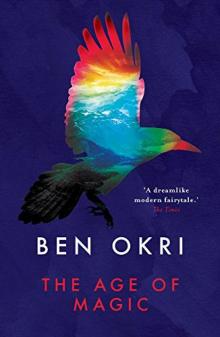 The Age of Magic
The Age of Magic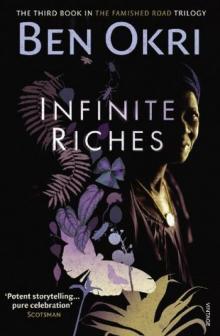 Infinite Riches
Infinite Riches Songs of Enchantment
Songs of Enchantment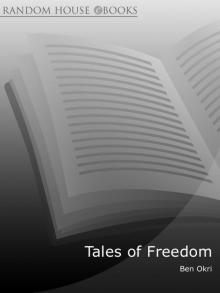 Tales of Freedom
Tales of Freedom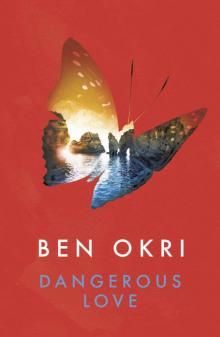 Dangerous Love
Dangerous Love Starbook
Starbook The Famished Road
The Famished Road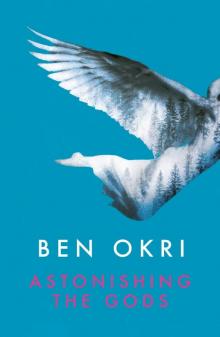 Astonishing the Gods
Astonishing the Gods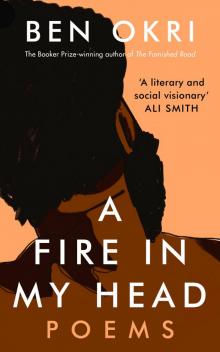 A Fire in My Head
A Fire in My Head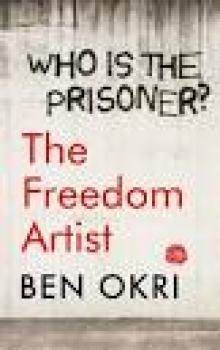 The Freedom Artist
The Freedom Artist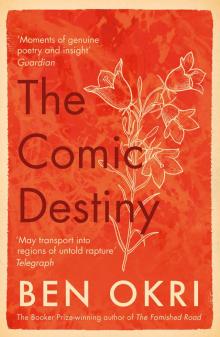 The Comic Destiny
The Comic Destiny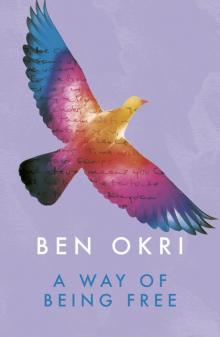 A Way of Being Free
A Way of Being Free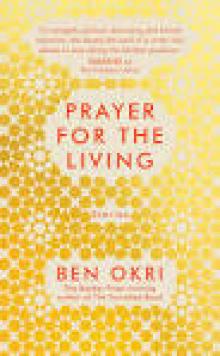 Prayer for the Living
Prayer for the Living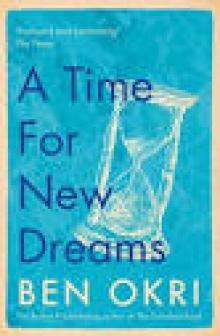 A Time for New Dreams
A Time for New Dreams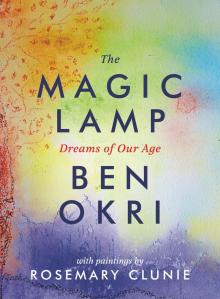 The Magic Lamp
The Magic Lamp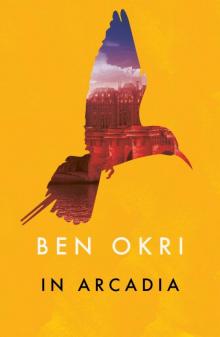 In Arcadia
In Arcadia